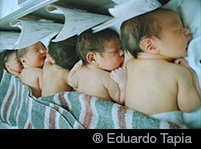Poca Madre
Guayaquil, Ecuador 2002
In May of 2001, during the award ceremony of the Simbolo de Libertad prize in Quito, Ecuador I stressed the importance to make an effort to improve the photographic level of the country.
In May of 2002, I had the privilege to dictate the first Ecuadorian photographic workshop in the city of Guyaquil.
Before starting a new workshop, I always try not to have any expectations in order to face the students with lots of humility and simplicity.
Twelve photographers of the country different news medias had been selected to participate.
The majority hadn’t brought a portfolio and the few ones that had done so showed a very modest photographic quality. Some of them, I discovered this later, didn’t even have their own camera.
When I finished looking at the last portfolio, I told myself that the moment had come to demonstrate how I was going to help each one of them to become aware that yes, it was possible take more profound and better pictures.
The first thing I told them was that I deeply respected each one of them as photographers because I knew how a hard job is to work for a newspaper. Although I’ve always worked as a freelance (which is also a difficult profession to be in), since my beginning I had had the opportunity to see other colleagues fighting against brutal deadlines to take an interesting image.
I proposed that each one of them would chose just one theme and probe it during the ten days of the workshop.
I told them that I knew that it was not going to be easy, that they were going to wear their eyes out trying to deepen their story, but I also told me that this was the only way to take more profound photos, images that would manage to take off from reality and reveal the essence of some of the moments of our precious daily life.
Daniela, Gianna, Alfredo, Diego, Edoardo, Francisco, Ivan, Jose, Mario, Martin, Patricio and Rodrigo kept looking at me surprised and in disbelief as if I was proposing them to go photograph the moon.
Some of them, so used to having to photograph many assignments in one day, were afraid of having so much time to devote to just one subject. Very simply I told them that yes, it was possible, and that they had to do it if they wanted to stay in the workshop.
Thanks to the Universo Foundation we were able to get permission to photograph some places with limited access such as a jail, a psychiatric hospital, an infant hospital, a maternity ward, a restricted area where aids patients fought their daily battle against death. A photographer decided to take pictures of a group of handicapped people, an other the daily life of the Avenida 9 de Octubre, one of the most crowded central avenues in Guyaquil and finally another photographer documented the daily life of the cemetery.
As the days were passing and the images began to arrive daily, I sat down to look at them, to discuss them one to one in the morning and as a group in the afternoon. Already on the third day, the tuning in among all was growing because we began after many long hours of working together to get to know one another better; we all started going out for dinner, to share our lives.
In my free time, I’d go with some of them to photograph in order to show them how I was also making a myriad mistakes, to make them understand that to take a truly good picture, a picture that would drive me crazy it’s not easy thing because it combines at the same time rapidity, sensitivity, a good eye and a good dose of luck that the Goddess of photography every now and then gives to the most courageous of us.
We began to look at the first photographic gems that daily present themselves before our eyes.
There were moments of frustration and despair when of the many rolls taken each day, I wouldn’t choose any photographs by any of them. But in the end, when we had more than sixty images on the table before us, a contagious great emotion started spreading unexpectedly. The best images that each photographer had taken during the course of the workshop were before our eyes.
I almost didn’t have to explain the reasons why I liked or disliked an image: a choir of voices explained, with a recently acquired visual vocabulary, the subtle reasons that along with some secondary elements manage to make a photo successful or terribly boring.
As a maestro, as a teacher I believe that it was this new ability on the part of the students to read photographs that gave me a lot of satisfaction. It moved me deeply to see that the photographic level of each student had grown. It was exactly for these reasons that I was there with them, sharing these days in our life.
It was like this that the group De Poca Madre was born. Its name chosen by a very funny expression used in Mexican Spanish that Daniela Merino, ‘my favorite student’ as she declared herself, utilized very often to describe a good photo.
I thank all of you for having given me these unforgettable emotions and memories.
And always remember that I like the vast majority of these photographs but only a few, very few drive me crazy.
Bazante (my new last name that Daniela also gave me)


